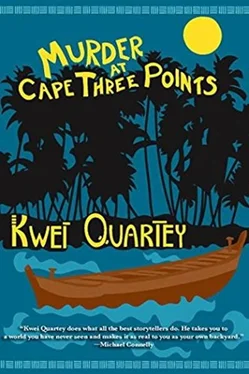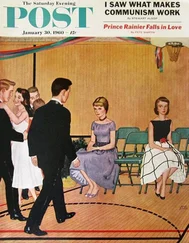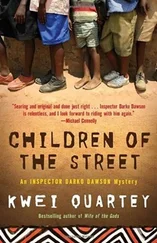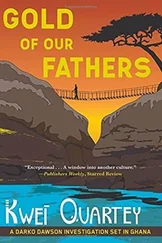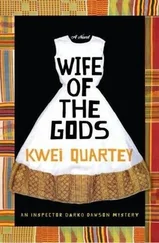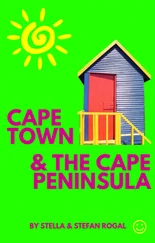“No, I don’t, but maybe the murderer wanted people to think so, in order to shield the real motive behind it. That’s what I have to find out: the real motive.”
ON THE STATE TRANSPORT bus to Sekondi-Takoradi, Dawson squeezed in between the window and a large woman with no boundaries. Christine and the boys had seen him off at the house and Hosiah had been close to tears, which brought a lump to Dawson’s throat. Christine was right. Brave as their son was, he needed his father to be with him right now. Emotionally and physically, he was still fragile.
Gazing out his window, Dawson tried to stop his brooding as the bus sped along the George H. Bush Highway. He turned his thoughts to his destination, the twin city of Sekondi-Takoradi. It was the capital of the Western Region (WR); Sekondi was the administrative section, while Takoradi was more commercial. Dawson’s father, Jacob, had grown up in Takoradi and moved to Accra as a young man. In Accra, he met Dawson’s mother, Beatrice, an Ewe woman. Although Jacob seldom if ever visited Takoradi these days, he still had family there, including a nephew called Abraham, or “Abe.”
Dawson had called his cousin to ask if he could possibly stay with him while in town. The Ghana Police Service (GPS) was so unlikely to pay for accommodation or transportation costs that submitting receipts for expenses was a waste of time.
Abraham, who lived above his stationery store in downtown Takoradi, had told him that with his two teenage children at home, there was no space. But he had a better idea. He was remodeling a small family bungalow a mere ten minutes away. Hoping to profit from the boom in the hospitality industry spurred by the discovery of oil, he planned to rent the bungalow once he completed it. If Dawson didn’t mind the state of incompletion of the place, Abraham had said, he was welcome to bunk there. It was an offer Dawson would have been a fool to refuse. When he had visited Takoradi as a teen, Abraham had been in his early twenties. It had been a long time since the two had seen each other, but that didn’t matter. Family was family, and Abraham was more than happy to help.
On the open road, the bus passed Weija Lake on the right. It was the beginning of November, and although heavy rainfall was over for the year, the landscape was still verdant and rich. Deep green foliage covered the hills and hugged the roadsides. Soon, the dry season would arrive with its persistent Harmattan haze: fine particles of dust blown down from the Sahara from November to March.
Immediately after they’d passed Cape Coast University in the Central Region, the beach made its appearance on their left. The blue-green of the sea looked like a painting with the foamy white of the waves breaking at the shore, and the coconut palm fronds, atop spindly trunks that grew off vertical. It all looked freer and wilder than Accra’s beaches. Dawson shuddered at the thought of swimming in the sea. He had not spent much time at the beach as a child, and he could barely swim. On the few occasions he’d ventured into the surf at Labadi Beach, he’d been frightened by the strong undertow.
After passing through the town of Sefwi, they went through a checkpoint and entered the Western Region. An hour later, they were on the final approach to Takoradi. Flame trees lined the roadside into town, reaching to form a leafy arch that would turn scarlet when the flowers bloomed. It was around 5:30, and the sun had become oblique and softer. They came to a roundabout called Paa Grant, the greenest and most luxuriant circle Dawson had ever seen.
Dawson dialed Abraham’s number. It went through and a man answered.
“Abraham?” Dawson said.
“Darko! Are you around?”
“Yes, we’re coming into the city now.”
“Oh, wonderful!” Abraham’s voice was smooth but dense, setting off a reaction in Dawson. Voices triggered his sense of touch-he could feel it in his hand or fingers, mostly on the left side, but as Dr. Biney had explained to him, what was happening was entirely inside his brain. Synesthesia was the name of the phenomenon in which the stimulation of one of the senses leads to an automatic experience in another sense. Dawson, a synesthete, had vocal sound-to-touch synesthesia. He could never predict what might set it off-a voice as rough as sandpaper or as sweet as a musical instrument. Sometimes, it acted as a lie detector when a change in vocal tone set off his synesthesia, but it wasn’t infallible. Good liars could sneak past Dawson.
He could recall experiencing it as far back as the age of two. His mother, Beatrice, increasingly noticed him staring at one or both hands, usually his left. The first time Darko ever said anything to her about it was when he was four. He told Mama that when his nursery school teacher was talking, it made “his hand tickle.” She hadn’t a clue what he was talking about then, but as he grew older, Mama came to learn that it was a real phenomenon even though she didn’t understand it. She warned him repeatedly not to talk about it with others outside the close family.
“Why, Mama?”
“Because people might think you’re a wizard, or possessed by spirits,” she told him.
His brother, Cairo, was familiar with it, and Hosiah had a game in which he would make funny voices while holding Dawson’s hand in the hope that he would feel something.
Abraham’s voice was strongly triggering his synesthesia. He felt as though his left hand was massaging a handful of wet clay. When he was a boy, a potter had once pressed a clump of fresh clay into his hand. Darko had giggled with delight as he squished it through his fingers. As an adult, he still liked the sensation, and that Abraham had induced it confirmed that he was experiencing a positive connection with his cousin.
“I’ll see you at the bus depot,” Abraham said.
As the bus continued its route toward the STC station, Dawson made comparisons with Accra. Unlike his hometown, Takoradi had labeled its streets with clearly marked blue and white signs. Above each, in white letters on a red background, was a DO NOT LITTER warning. Dawson had the impression that people were at least in part taking heed.
In Takoradi, Ghanaian street names like Ako Adjei coexisted with British ones-Ferguson, Hayford, Kitson, and so on-a legacy of the British colonial occupation of Ghana from the nineteenth to the twentieth century. In the Central and Western Regions, the land of the Fante ethnic group, to which Dawson’s father Jacob belonged, surnames of Dutch, Portuguese, German, and British origin were common.
Its air brakes wheezing and puffing, the bus pulled into the wide STC yard and parked. Dawson waited until his ample seatmate had heaved herself out and then alighted to pick up his bag. He looked around for Abraham, realizing he didn’t know what his cousin looked like these days. He watched the crowd milling about.
“Darko!”
Dawson turned and saw someone hurrying in his direction. He was overweight, of average height. “Abraham?”
“Yes!” He shook hands and hugged Dawson. “How are you? It’s good to see you! Welcome to Takoradi.” His round face shone with delight. “Let me take your bag. I’m parked over there.”
“Thank you. How did you recognize me so easily?”
“Have you forgotten your picture was in all the papers last year after you caught that serial killer?”
“Oh, I see,” Dawson said, laughing. “Yes, I had forgotten.”
They got into Abe’s car, a yellow Toyota Corolla. Abraham talked continuously as they made their way through the center of town. He had an easy laugh and was quite funny. He drove aggressively, which surprised Dawson because his nature seemed otherwise easygoing.
“Traffic is heavy,” Abraham commented.
Читать дальше
